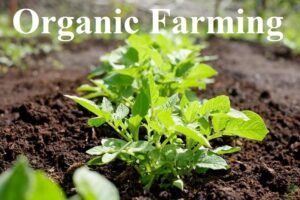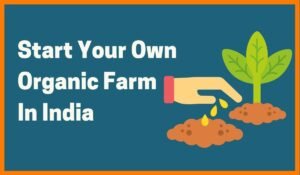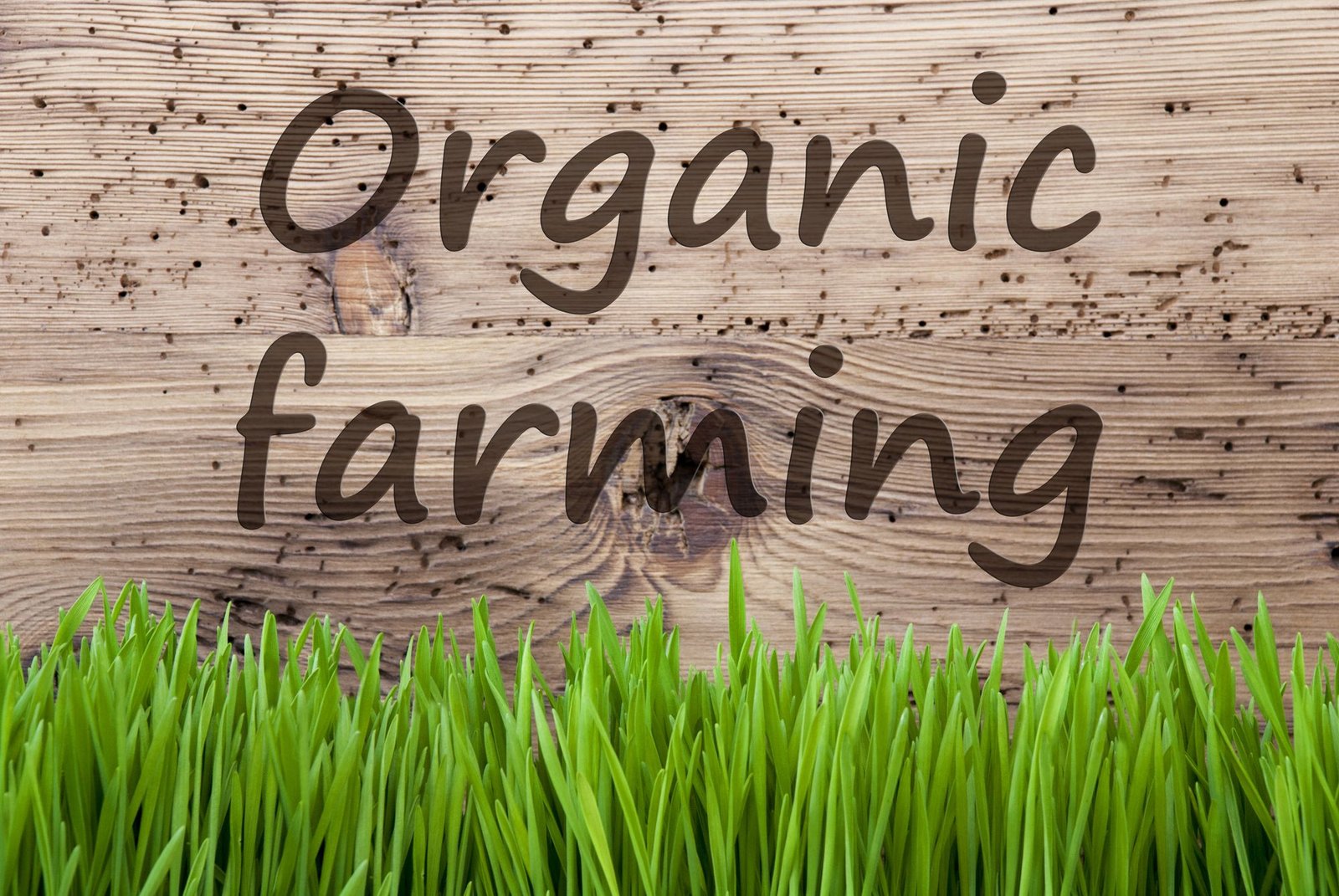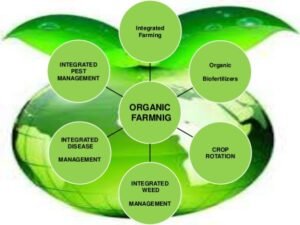What is organic farming ?
Organic farming is a method of farming that focuses on using natural methods to grow crops and raise animals. This approach to farming is based on the principles of sustainability, biodiversity, and preserving the natural environment. Organic farmers use methods such as crop rotation, composting, and natural predators to control pests and diseases, rather than relying on synthetic chemicals.
One of the key principles of organic farming is the use of natural methods to control pests and diseases. This includes using crop rotation to disrupt the lifecycle of pests, planting companion crops to repel pests, and using natural predators to control pests. Organic farmers also rely on composting to provide plants with the necessary nutrients. Composting is the process of breaking down organic matter, such as leaves and food scraps, to create a nutrient-rich soil amendment.

Read more: Organic French Beans Production Guide
Another important principle of organic farming is preserving biodiversity. Organic farmers strive to maintain a balance between different species of plants and animals on the farm. This includes planting a variety of crops, maintaining habitats for beneficial insects and wildlife, and preserving natural areas on the farm.
Organic farmers also use sustainable methods to manage their land and resources. This includes using water conservation techniques, such as drip irrigation, and implementing soil conservation practices to prevent erosion and protect soil health. Organic farmers also avoid using synthetic fertilizers, pesticides, and genetically modified organisms.

Read more: Complete Guide to Start Organic Farming Vegetables.
Organic farming can also have benefits for human health, as organic produce is often perceived as being healthier and more nutritious than conventionally grown produce. Organic farming also promotes animal welfare, as organic farmers are required to provide animals with access to the outdoors, and to use humane methods of slaughter.
Organic farming can also be beneficial for the environment. Organic farming methods can help to reduce
Starting an organic farming
Starting an organic farm can be a challenging but rewarding process. It requires careful planning, research, and a commitment to using sustainable and natural methods of farming. Here are some steps to help you get started with organic farming:
Read more: Multiple Cropping & Crop Rotation In Organic Farming
Research and educate yourself: Before starting an organic farm, it’s important to do your research and educate yourself about organic farming methods, principles, and regulations. Learn about crop rotation, composting, natural pest control, and other organic farming techniques. Additionally, familiarize yourself with the organic certification process and the regulations that apply to organic farming in your area.

Develop a farm plan: Once you have a good understanding of organic farming methods, develop a farm plan that outlines your goals, resources, and strategies for achieving them. This plan should include details about the crops you plan to grow, the animals you plan to raise, and the methods you will use to manage pests, diseases, and soil fertility.
Read more: How To Take Organic Certification In India
Choose a suitable location: Select a location for your farm that has the right soil, climate, and water resources for the crops and animals you plan to raise. Consider factors such as access to markets, transportation, and labor.
Build a team: Starting an organic farm can be a lot of work, and it’s important to have a team of people to help you. This may include family members, friends, or hired help.
Read more: Complete Guide To Start Organic Farming in India.
Obtain necessary equipment and supplies: Obtain the necessary equipment and supplies to start your farm. This may include tools, seeds, seedlings, feed, and other materials.
Start small: Starting small allows you to learn the ins and outs of farming, and to make any necessary adjustments before expanding.
Start with easy-to-grow crops: Start with easy-to-grow crops like greens and herbs, which are typically less demanding in terms of soil and climate requirements.
Learn to compost: Composting is an essential part of organic farming, and it’s important to learn how to make and use compost to enrich your soil.
Get certified: Once you have a good understanding of organic farming methods and you’ve been farming organically for a year, you can apply for organic certification. This will allow you to market your products as organic and may qualify you for certain government programs.

Read More: How to Produce Organic Cucurbits?
how to start organic farming business?
Starting an organic farming business can be a challenging but rewarding process. Here are some steps to help you get started with an organic farming business:
Develop a business plan: Before starting an organic farming business, it’s important to develop a comprehensive business plan that outlines your goals, resources, and strategies for achieving them. This plan should include details about the products you plan to grow or raise, your target market, and your financial projections.
Research your market: Research your local and regional market to determine the demand for organic products and the competition in your area. Identify the target customers and their preferences. Understand the pricing and the distribution channels.
Choose a suitable location: Select a location for your farm that has the right soil, climate, and water resources for the products you plan to grow or raise. Also, consider factors such as access to markets, transportation, and labor.
Read more: How To Start Organic Farming?
Obtain necessary equipment and supplies: Obtain the necessary equipment and supplies to start your business. This may include tools, seeds, seedlings, feed, and other materials.
Get certified: Organic certification is an important step in starting an organic farming business. It verifies that your farm meets the organic production standards set by the USDA and it allows you to market your products as organic.
Develop a marketing strategy: Develop a marketing strategy that targets your target customers. This may include creating a website, social media presence, and attending farmers markets, community events, and trade shows.
Create a distribution network: Create a distribution network to sell your products. This may include establishing relationships with local retailers, wholesalers, and restaurants.
Build a team: Building a team of skilled and dedicated individuals can help ensure the success of your organic farming business. This may include hiring employees, volunteers, or interns.

Read more: High Yield Organic Tomato Production Guide.
Continuously improve: Continuously improve your farming practices, learn from your mistakes, adapt to changes in the market, and strive to produce high-quality organic products.
Be prepared for the hard work: Organic farming is hard work and it takes a lot of time, patience, and dedication to succeed. Be prepared to put in long hours and be ready to face challenges and obstacles.
Read more: Increasing role of Biofertilizers in India.
In conclusion, starting an organic farming business requires careful planning, research, and a commitment to using sustainable and natural methods of farming. It’s important to develop a comprehensive business plan, research your market, choose a suitable location, obtain necessary equipment and supplies, get certified, develop a marketing strategy, create a distribution network, build a team, continuously improve and be prepared for the hard work. With the right approach and mindset, an organic farming business can be a successful and rewarding venture.




